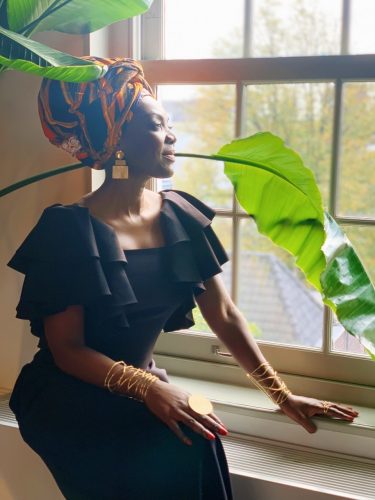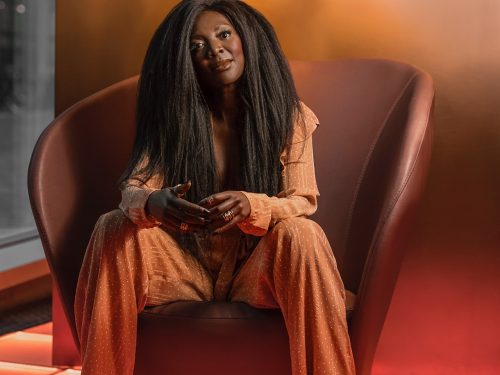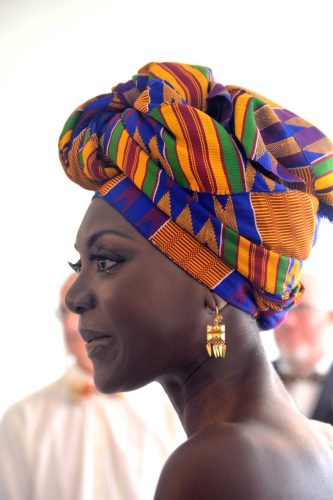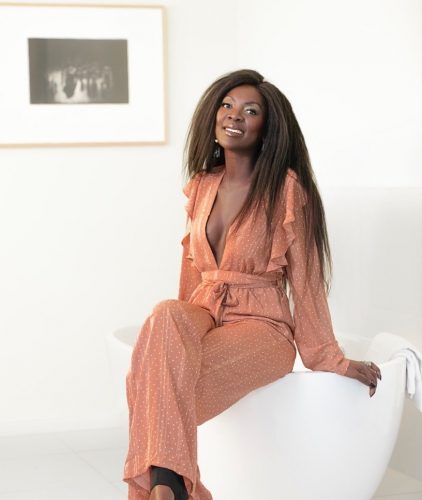The death of George Floyd has sparked huge protests in the US and around the world. The story of George Floyd has been the story of black people aver since 401 years ago and It’s time for a change. Too many years of being asked to numb it had caused it to explode. None of this is new for black people and we can’t stay silent or be comfortable in the midst of all this hate. I believe this moment is a real turning point to bring real change and I think it’s good to raise awareness, educate, share knowledge. As Martin Luther King said: “Darkness cannot drive out darkness, only light can do that. Hate can not drive out hate, only love can do that”.
Irene Hin and I go way back and have been friends for over 25 years. In all these years we have never ever discussed race, discrimination, or systematic racism in-depth like we did since the tragic death of George Floyd. We both feel truly saddened by the tragic while reminding us of all the times we were treated differently, starting from our childhood.
While exchanging memories I felt the need to share her story and ideas.

So, Irene, we go way back and really got to know each other when I braided your hair. Tell us a little about yourself.
Thanks so much for giving me this opportunity Amanda. Being friends for so long, I have always had tremendous admiration and respect for what you created with your amazing platform. I feel honored that you asked me to participate.
My name is Irene Agyeman Hin. Irene means Goddes of Peace and Agyeman is a name which was handed down to my father by the Queen Mother of the Ashante Region, and it means: ‘She who will reclaim her land’…Born in Ghana & matured in The Netherlands from the age of 2.
I am the mother of a teenage Son, married to gentle giant and very (chosen) family orientated. I have a degree in Marketing Communications & Event Marketing and a passion for people and conscience creative projects. After a professional career in that industry, I co-founded Lady Africa in 2011. After several trips to the continent, I really wanted to contribute to telling a different, positive story about Africa and it’s original Designs (Fashion & Accessories).
I am proud that we were able to leave our footprint/mark by giving a platform to African (Diaspora) Brands and BOB as well as producing our own Lady Africa brand and raising awareness about African Fashion in The Netherlands and abroad. With this, we built a much treasured inclusive community of followers.
My work and especially my entrepreneurship is always about people empowerment, period. About women, marginalized individuals or groups, the underdog so to speak. I love working with Artisans who don’t necessarily have a flashy brand but make the most amazing jewelry, fashion, or other art. I can see their brand, their art in a heartbeat and I love working side by side to find out opportunities to move forward and grow. I have always wanted to create or hold space for people to be able to be their authentic selves and look for their natural potential. As a child of an African mother and a Dutch father, and growing up in a mixed family in The Netherlands, this speaks to the essence of my being as this was always an issue for other people…
You started the fashion label Lady Africa years ago and at a certain point, even Dutch Queen Maxima was spotted wearing your ensembles. What was your goal?
After visiting my Country of Birth (Ghana) on a working trip for a photo report, I reconnected again with people and the place of my origin. I was in awe with the beautiful landscape, the resilience and strength of the people, especially the women I interacted with. Often women who had a tough life, making ends meet. Selling colorful wax print fabrics or food etc on markets. Actually most of them were (small) business owners, like my maternal Grandmother who would also sell food and cloth on the market in Ghana. Their natural beauty was enhanced by their poise, their clothes, and jewelry. I think that time I saw the African Ladies through a different lens.

The women we photographed were all radiating such pride and joy, it was so impactful. I saw their beauty and strength and I knew then and there I made a commitment that I wanted to contribute my time, efforts, and voice to show this very positive and powerful side of Africa, one that we don’t often hear about. We were almost used to hear about Africa in more negative ways, such as; wars, poverty, famine, diseases, etc. I was determined to contribute to a more positive narrative about Africa by showing ‘it’s pride and beauty’ and connect with both my Dutch and African roots.
Which became Lady Africa. My goal was to build bridges between these 2 worlds by importing African Designer Fashion and Accessory Labels from the continent as well as the African Diaspora. Mostly handmade by artisans or sustainable, conscious brands by both established African Designers or upcoming Designers or Artisan originated start-ups.
Quality was of the essence and also we curated brands that at least were working towards giving back to their communities.
Another goal was to show the wide range of African Fashion since it is kind of a misconception that African Fashion is always colorful and bright. In The Netherlands, African Fashion was always displayed in a certain way, known for it’s ‘Dutch Wax’, (colorful printed cotton wax cloth which is mainly produced here to sell to the African Market) but almost never in a way that could become more mainstream or for a larger range of fashion enthusiasts.
We also wanted to show that there was already a multi-million dollar industry focused on African Fashion in all it’s splendor yet the Dutch Fashion industry always referred to it in terms of another trend. We all know the stories of big European Brands taking their inspiration from the continent and its makers and rarely compensating the originators. The pioneering years were mindblowing to us. From setting eyes on the more traditional wear to tremendous high-end and trendy Designer brands. We learned so much ourselves by researching what was available on and outside the continent. The detailing, the craftsmanship, the stories behind the makers, it is all so rich and empowering!
Actually other European Countries, as well as the USA, were way ahead of the Fashion Scene becoming far more inclusive and we simply had to catch up in NL. It was an amazing journey, pioneering in the Netherlands, as we started with opening pop-up shops in Rotterdam, Amsterdam & The Hague. We often collaborated with more BO-businesses and often BIPOC female entrepreneurs. It was very important for me to create a community in which we also held space for other fellow entrepreneurs or professionals to prosper.
Along with our boutique, we also grew our wonderful community by celebrating our new collections with many customer events (which is also one of my great passions) and energetic Fashion shows in which we incorporated our signature: ‘LA Model for a day©’-concept. In addition to professional fashion-models, we added non-professional members from our community to display their beautiful authentic self on the runway as a way of paying tribute to our colorful fashion family.
We settled down in our boutique on the prestigious Denneweg in The Hague for 5 years. I am very proud to say that in a way that shop was symbolic of a safe & energetic space for likeminded people to come and celebrate African Design as well as each other. We welcomed the most amazing people in our shop, off all walks of life. But yes having HRH Queen Máxima as our customer was definitely a Royal moment for us. Especially in light of what is happening in the World today, it is extra special and we so cherish these amazing moments.


Can you remember the first time you felt you were treated differently? How did that make you feel?
I am sure it was not the first time I felt I was treated differently, but it has been one of the most defining and impactful moments of my life. My father is Dutch, and one day, we as a family went on a spontaneous visit to my uncle’s house (my father’s brother). My Dutch Grandmother was there and as we came out of the car, we noticed a big commotion going on, with my aunt and uncle walking in and out of their house. What happened was, that as we were pulling up my Grandmother stated that she didn’t want to meet and greet us, meaning my mother, my sisters, and myself. So she was pushed into one room while we entered the house, completely clueless. And we were sort of maneuvered into one corner, while Grandmother’s request was facilitated. I can still remember, anxiously awaiting, hoping my Grandmother to come out, saying she made a mistake and wanted to see her grandchildren and daughter in law. No such thing happened. I think everybody was shocked. But in short: The door did open for her to finally appear, she reluctantly greeted us while overstretching herself to look away and she did extend out her hand to ‘greet’ us and then she disappeared again into that room. That was the only time I ‘met’ her alive. The next time I saw her was at her funeral and I was about 12 years old. To this day this is still one of my most painful memories of myself and my family being treated differently.
Do you feel these experiences changed you, your perspective, and your dreams?
I think it did, even as a child I remember really not understanding why adults would do or say nasty things to you. And that was an adult against a child, which is just Ludacris. Even in the most subtle things, you could be ‘othered’. I also remember just always putting my best foot forward, behaving best so ‘they’ at least couldn’t single you out on that, if not your color. I am very thankful my parents always believed in me, motivated and championed me to be and do what I wanted to become since the teachers at the elementary school stated very clearly that there was not much future perspective for me, only the bare minimum was to be expected…. I remember feeling very bumped out about that.
And also I thought: ‘But hey, don’t you know that I can do much more, don’t you really know that I have so much more to offer?’ , but also since the teachers didn’t see it, I started doubting myself too. That duality of self-consciousness and determination. I have spent most of my life in predominantly white surroundings; school, university, work environments. By creating the Lady Africa community we created a wonderfully inclusive community that housed a broad selection of diverse community members, not only of diverse backgrounds in terms of ethnicity but also gender, religion, etc. By staying connected, talking, learning to engage with people you grow I believe in a better version of you.
It may be very idealistic of me to look at it that way. And I know it is sometimes very confrontational and disappointing to see that we are still protesting, still advocating for the same things as other generations have protested against way before us. That makes you sad and think; Really, have we not moved on since then?
But I refuse to give up hope and often I just think of that song by John Lennon: “Imagine; you may say I’m a dreamer, but I am not the only one”. And the words of Martin Luther King; ‘I have a dream’…. It is almost inconceivable that we are in yet another revolution, still working towards those dreams and rights and it is 2020. But I believe dreams are the fuel for change.
What do you think will help in accomplishing the much-needed change for once and for all?
I believe the fight against racism begins with being informed and the willingness to (self)reflect. It somehow seems that especially in The Netherlands only now with the recent development a bigger group of people are beginning to really understand how racism manifests itself, what its devastating effects are, and only then we can work on how it can be countered.
Some (helpful) changes I notice are:
– It seems that the movement to end injustice is growing, unfortunately, with every painful murder, awareness, anger, and resentment grows.
– And also the urge & willingness of people to really make a permanent change. Also, more businesses, institutions, legislators, and politics are getting involved.
– It seems somehow that what is different somehow that protests are really taking momentum in terms of it is now the longest period of protests, with the biggest and most diverse group of people and white people pulling up, speaking out.
– There is far more actual footage available of the police brutality or racial acts of violence now that people are filming and sharing these acts on all social platforms. Because of that, there is at least more pressure to go after the perpetrators. There is more evidence of what is actually happening, so no more denial of proof.
– A big one is that POC is beginning to share more personal stories from what they have suffered through their social channels and it’s finally beginning to open eyes. Finally, we are letting out how racism, racial discrimination, and xenophobia have impacted on all our lives, but especially on those who are its victims. Racism is to be found in all parts of the world. It is present in the workplace, in education, in health care, and in the courts. It is to be found in the media and the Internet. And also by Influencers speaking to their followers, more people are beginning to tap into their stories and really listening.
– Also finally POC are being invited on tv as well as social channels before that was not happening as much.
– People are calling out other people on their racist remarks etc so people are held accountable for their behavior.
– Now that more funding is going to support to ending racism through various charity channels, the movement is becoming stronger in monetary ways.
– On a personal note, I would like to add that it is important we ALL continue to do the work towards healing this appalling system since we are in this together. It is important that in spite of so much hate and injustice, fear, and anger, we have to try to find each other, stay connected, and build bridges. It is very painful for traumatized people to keep turning the other cheek, to have to explain over and over again what is so wrong about micro-aggression or worse. Yet as exhausting it is for people (BIPOC) who have been experiencing so much trauma, I would like to remain hopeful and believe that now finally a growing majority of people will find a way to commit to, speak up, pull up, demonstrate, join in the discussion, address issues, donate or do whatever it takes to end injustice worldwide. We have to acknowledge some may go fast, some are just beginning to open their eyes or at the beginning of their advocacy career, some are in full combat mode, which is also really understandable, some are taking baby steps. But We are a collective now, one of the biggest movements in history, our individual voices are being amplified by all that has been going on. People are being called out! And the best piece of advice I came across through my own research is that we have to keep it moving, keep our foot on the gas!!
Through:
– Education > this has to be addressed within all layers of the school system but also or adults in the workplace, communities, etc.
– Conversations, some will be tough and uncomfortable, go through it, sit in it. Commit to your circle or network and do the work. AND again LISTEN really listen to each other. I believe that behind the uncomfortableness there is room for growth and where there is growth there is life…
– Continue to speak up and out for yourself and each other.
– Stay open-minded and hear centered.
– Support systems go: help, uplift, connect with each other.
– Take time to heal, it is important not to mask your pain with outrage or apathy. Take the initiative to reclaim your power by seeking support through friends and family or professionals. And also we are in this for the long run, so If you need to practice self-care to regain your energy, do just that.
– Support and connect with your personal friends, professionals, politicians, and entrepreneurs of color, make it a point to check the diversity in your network, and what you can contribute to making this world a better place. Really engage.
What are your hopes and dreams for the future?
My hopes are that both these pandemics (COVID19 and injustice towards POC) will add to us all doing some necessary soulsearching, becoming less focused on ‘me’ and more on ‘we’. To talk less and listen more. That we continue to strive to do the right thing. Personally I will continue to pursue working on conscious projects that focus on sustainable solutions towards the empowerment of people. I will continue to collaborate with partners, organisations, businesses, and institutions (such as a mentoring project at schools that train their students on entrepreneurship, or helping especially students of color to access internships at businesses or institutions) who would also like my expertise on that matter.
We took an indefinite company sabbatical last year with Lady Africa yet it is interesting how team-members are beginning to re-connect and reflect again on how we could contribute and make a positive impact again on what is going on in the world. Of course, we still have dreams on growing this Lady Africa Entrepreneurship and the empowerment of African Designers/Artisans. Maybe it’s time to get back in the saddle again….
And on a personal note, I really crave to go back to the continent and share stories with so many amazing Artisans.
What a dream that would be.
xx
